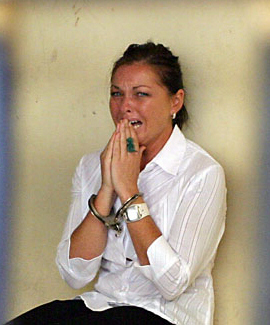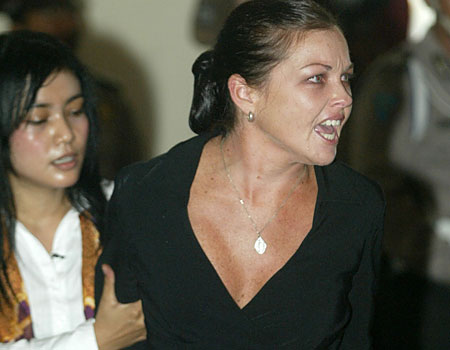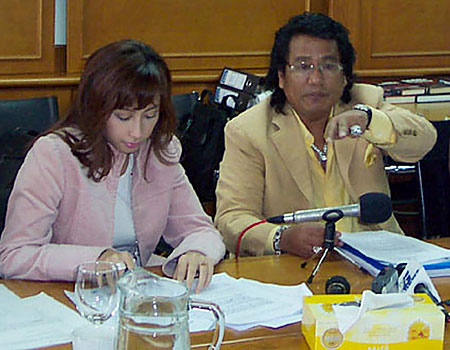Because she was innocent she begged for an investigation but the Bali Police, renowned to be one of the most corrupt organisations in the world, prevented any evidence from being collected, measured or presented before the court.
Many people believe Schapelle was guilty. They believe it because no one in our government, our media of from our universities has come forward to support her.
When John Howard told us that we should respect the Indonesian court and abide by its decisions he wasn’t making a request. It was ‘poli-speak’ for, “You WILL abide by the decisions of the Indonesian court” and he didn’t add conditions like “as long as they aren’t targeting innocent tourists for political capital.”
The Australian government could not allow its people to be critical of the Indonesian court or of the Indonesian government and they were prepared to do whatever was required to make that a reality. Schapelle was sacrificed for political expediency and the Australian public were conned.
The Australian media have waged a war against Schapelle ignoring the fact that no one takes marijuana from Australia to Bali and none has ever been seized. They have lied, promoted false witnesses, reported unsupported slurs and minimised the inconsistencies in a vain attempt to convince people that she really is guilty.
Their repeated failures prove that no evidence has ever existed for a crime that would leave a money trail, along with witnesses and other evidence hard to erase.
Professor Tim Lindsay called Indonesia a ‘thriving democracy’ and our government maintains that the Indonesian court is run according to the rule of law. We are supposed to believe that the authoritarian military government renowned for its brutality and its sham trials surrendered power willingly to adopt democracy.
Schapelle’s trial was a sham and the only explanation for the Bali Police vetoing their own evidence is because they planted the drugs or they were covering up for those who did – the marijuana was Indonesian.
If Schapelle were guilty, the use of smear, innuendo and unsupported attacks would be unnecessary when the evidence that proved her guilt would serve far better. So, we can assume that there is no hydroponic equipment, unexplained income, suspicious purchases or the telltale signs that would still exist if the Corbys were involved in the marijuana trade.
Schapelle was innocent and this was a political trial.
While Schapelle was pleading “not guilty” her defence team colluded with the police by ignoring the prosecution's case and negating Schapelle's rights under Indonesian Law. They created the pretence of a defence by chasing fictitious criminal baggage handlers that they already knew did not exist.
They certainly didn’t challenge the court’s instructions that Schapelle who was claiming ignorance of the crime had to name the true culprits and left the Australian public to believe that this was a part of Indonesian law. This was a deliberate deception that was created to minimise the need to test the available evidence at the time of her arrest.
The case was simple. By fingerprinting the plastic, by weighing Schapelle's luggage with the marijuana and comparing that to the weight printed on her ticket and by forensically testing the marijuana for country of origin along with identifying the hair caught in the sticky resin, the truth would be known and Schapelle would have been proven innocent or guilty.
While it was impossible to weigh her luggage after the bags had been dispersed, and fingerprinting became less and less of an option as even the judges handled the plastic in front of the media, the forensic testing of the marijuana remained a possibility throughout both trials.
After Schapelle's lawyer, Irwin Siregar, had explained to the court that the inner plastic bag could still be dusted for fingerprints, Judge Linton Sirait responded by handling the inner bag. The defence team got the message that fingerprinting would not be allowed.
Schapelle had been pleading for this evidence to be collected and signed an AFP form to have the marijuana forensically tested.
Her lawyers completely ignored her request and told the media that since the country of origin was not in dispute there was no need to analyse the marijuana. They had no knowledge of Australian interstate drug trafficking but insisted that the persons responsible had to be Australian baggage handlers.
Even if this was true it was not the job of her lawyers to solve the crime. It was their job to challenge the prosecution’s case. The prosecution had claimed that Schapelle had imported the marijuana. The defence had no right to agree with them. It was their job to demand that the prosecution prove this by having the drugs analysed.
This was no minor point. There had never been a case where anyone had imported marijuana into Bali. No Australian marijuana had ever been seized in Bali and if this was the first recorded case then it confounded all current thinking on drug trafficking. Regardless of the lies pushed by the Australian media, Indonesian drug dealers in Bali would not tolerate competition from Australian drug dealers and no Australian marijuana has ever been siezed there.
So why didn’t Schapelle’s lawyers comply with her wishes and demand that the prosecution have the marijuana tested?
Why didn’t her lawyers publicly refute the claim that Australian marijuana was being sold on the streets of Bali?
By focusing solely on Australian baggage handlers, Schapelle’s lawyers took attention away from all things Indonesian.
Schapelle was charged with importing marijuana into Indonesia. The forensic testing of the drugs was not just evidence. Nor was it supportive, additional or optional evidence – it was the incriminating evidence and necessary to define the crime.
In addition, because the prosecution had said the marijuana was imported without allowing this fact to be established, Schapelle was found guilty not on the evidence but because the Bali Police and the prosecution said so.
The Australian media reported that it was the Corbys who refused the AFP’s offer to have the marijuana tested. This was an outright lie and hid the fact that Schapelle’s lawyers were complicit in the cover-up.
Schapelle asked the Australian Consulate repeatedly for the drugs to be forensically analysed until on the 3rd of December, the Australian consul gave her the form requesting that the Australian federal Police test the marijuana. She signed it and her request became official.
When the AFP responded by requesting that the Bali Police send them a sample, the Bali Police refused by replying that the AFP’s assistance was not required.
This was outrageous because it was Schapelle’s right to nominate an independent agency to test the incriminating evidence. The Bali Police had no right to answer on behalf of the defence.
More than that, since the prosecution was maintaining that the marijuana came from Australia, the Indonesian government were obligated to furnish Australian Law enforcement with a sample of the drugs so that those responsible in Australia could be arrested, to stop any future exportation of marijuana to Indonesia and to justify their claim that Australia was now a drug-exporting nation.
Why didn't the Australian government insist that a sample be given to them for these reasons?
What is stunning is that the prosecution did not want the drugs tested. If Schapelle had been guilty, then finding her hair in it would have meant an automatic conviction. Those detractors who insist Schapelle is guilty must believe that the prosecutor was letting her off the hook by not collecting their best and most conclusive evidence thereby giving her a fighting chance.
Didn’t the Bali Police care about the ‘war on drugs’? Didn’t they want to catch any others involved?
According to Mick Keelty, the commissioner for the AFP, when it was explained to Schapelle’s lawyers that any results of the test would be shared with the prosecution, the “Corby camp” decided that they did not want the test to be done. It was not the Corbys but her lawyers who made this decision and it was not her lawyer’s decision to make. It created the impression that the defence, namely Schapelle, was hiding the truth.
However, Keelty was also misrepresenting the truth by inferring that the AFP could test the marijuana if the defence agreed when the Bali Police had already said “No.”
The political message from Indonesia was that the Australian government should not interfere because Schapelle’s trial was an internal Indonesian matter. However, the assertion that the transnational exportation of marijuana from Australia was in any way an ‘internal Indonesian matter’ was nonsense.
Schapelle's lawyers colluded with the prosecution and called it ‘strategy’. They quietened Schapelle's misgivings and reassured her with lies, threats and bravado and Schapelle had no option but to believe that they were on her side and that they knew what they were doing. Certainly, no one in the Australian government or the media came to her rescue or pointed out the travesty that was occurring. In fact, the media completely ignored the physical evidence and the Indonesian refusal to collect it.
Because Indonesia has always been a dictatorship, the most Indonesian lawyers can do is to negotiate the best possible outcome for their client. They do not defy the police or call them liars and criminals – doing so would result in their own conviction and imprisonment for slander within Indonesia’s police-run courts. Since no one can accuse them of anything, this effectively puts the police above the law in Indonesia. They are corrupt because they have absolute power and no one to curtail corruption. Therefore, it is arguable that Schapelle’s lawyers were coerced into betraying Schapelle by giving the Indonesian National Police in Bali the conviction they had engineered.
Under these circumstances, Schapelle’s lawyers chose the Australian baggage handler scenario as a defence strategy because they knew that failure to find guilty baggage handlers would result in an automatic conviction.
Schapelle knew nothing about international drug trafficking or about how drugs are moved around Australia. Given the horror stories we hear from travellers about stolen luggage, it was natural for her and the Australian public to assume that Australian baggage handlers were involved.
However, in a case where a young woman’s life could be extinguished by a firing squad, we expected her lawyers and the media to seek out expert opinion from Australian police and government departments that would have data on drug arrests and seizures in Australian airports.
Her defence team never approached the Australian Federal Police to find out if marijuana had ever been seized from airfreight in Australia or whether it was likely to be true. Surely, they would want to be sure that their proposed defence strategy would be credible and gain testimonial support.
Instead, they parroted Schapelle’s beliefs with absolute certainty and assured her that everything they were ignoring was a part of their strategy. She was pleading ‘not guilty’ and therefore stating that she was ignorant of the crime. Why were people listening to her? Who cared what she thought?
On 12th of May 2005, Mick Keelty, the Commissioner for the Australian Federal Police was reported to have said that the Corby defence was "flimsy". Tanya Nolan on ABC local radio in Canberra said that Keelty was criticized by the Law Council for commenting on Schapelle’s on-going case when he said:
"There is very little intelligence to suggest that baggage handlers are using innocent people to traffic heroin or other drugs between states."http://www.abc.net.au/am/content/2005/s1367014.htm
However, this was more than seven months after Schapelle’s arrest. Why did it take the media that long to get Keelty’s opinion on this and why did her lawyers only find out then, during Schapelle’s trial, what Keelty would say?
Was Keelty lying? I understood why Schapelle’s supporters assumed that he was. After all, they believed whatever Schapelle’s lawyers were shovelling at that time. And, with 'War on drugs' myths like "All drugs are the same" mixed with tales of criminal baggage handlers importing other drugs made their involvement a believable assumption – on the surface, at least.
Marijuana is not transported around Australia by air. Its value is not that much higher than tobacco and does not have the profit margin to allow unnecessary handling. Airfreight is the riskiest means of transport available. Because it is grown in Australia and not imported, it is transported exclusively by road. In fact, marijuana in commercial quantities has not been discovered in Australian airfreight for over thirty years.
Schapelle’s defence team claimed they were trying to establish a case of ‘reasonable doubt’. If this was true then it was foolish of them to link Schapelle’s life or death to the success or failure of finding guilty Australian baggage handlers especially when there were so many other possible scenarios.
Followers of Abu Bakr Bashir could have planted the drugs in retribution for the part played by the Australian government when they insisted that the cleric be prosecuted. It could have been Denpassar baggage handlers using Schapelle’s luggage to move marijuana from other regions of Indonesia past Bali customs. Since it resulted in a negative public image for Australia and threatened to execute a random Australian perhaps it was an Indonesian hate crime.
Schapelle’s lawyers made a theatrical show of defence but gave no defence at all because they completely ignored the prosecution’s case. The prosecutor had the evidence of the marijuana that he claimed (without proving) came from Australia and all that was left to do was to prove that Schapelle had prior knowledge of the drugs.
Instead of using the physical evidence to establish Schapelle's prior knowledge, the prosecution used the customs officer, Winata, who claimed that Schapelle had said, “The marijuana is mine.”
Schapelle’s lawyers said nothing. They didn’t object. They didn’t cross-examine Winata or test his proficiency in English. Later when this man was interviewed by the world’s media he didn’t understand a single question put to him in English and required an interpreter to make the interview possible. His testimony of what Schapelle said in English convicted her.
According to Schapelle, she did say, “It’s mine” in reference to the boogie board bag when police took hold of her brother, James, for questioning. ‘Schapelle’ is a unique name and it was understandable that the Indonesian police assumed that the ‘surf board’ belonged to the only male in the group. Clearly, Schapelle’s response was to identify who owned the luggage and was not a confession of guilt.
Had Schapelle confessed and said, “The marijuana is mine,” why were Schapelle, Katrina and Ally ignored and left unguarded to come and go as they pleased while the Bali Police questioned James for half an hour?
Schapelle has never admitted to owning the marijuana or to even knowing about it and so the assertion that she said, “The marijuana is mine” is not believable whether she was guilty or not.
The saddest thing about the Corby case is what it did to this nation. The truth was there for all to see – Schapelle wanted the marijuana to be analysed and the Indonesian government didn’t. In fact, the Indonesian government was so resolute that they put paid agitators outside the court with signs that read, “Australia, no interference.”
Had Schapelle been guilty, the Australian government would not have stood idly by while a ‘drug ring’ exported drugs to our neighbour. They would have uncovered any incriminating evidence and pounced on any accomplices and arrested them for the crime they committed here in Australia. After all, this was no mere ‘marijuana offence’ but a diplomatic and political crisis.
The current media attacks would never have happened if Schapelle were guilty because the definitive and measurable evidence would be known to all.
The arrest was a set up and the trial was a sham. This would not have been possible unless the defence lawyers were under police control. Their task was to isolate Schapelle not to defend her. The Australian public eventually turned on her but not because of anything she said or did – that too was the handiwork of her lawyers.





